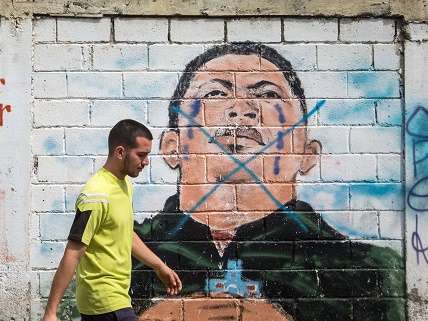Protests against Socialism in Venezuela Escalate Again, Not Because of Donald Trump
At least 20 people have died during unrest this month.

The socialist government of Venezuela has faced street protests on-and-off for more than the last three years, ever since it ramped up its crackdown on a growing opposition. Hugo Chavez, the late former president, was a popular figure in Venezuela, and among Western leftists, while the price of oil was high and giving him a cash flow he could use to buy his people's support.
Eventually he died, replaced by Nicolas Maduro, an even dimmer politician than Chavez, oil prices went down, and the system, as critics had long warned, began to collapse. The government started fingerprinting supermarket shoppers back in 2014, and its policies have led to hyperinflation and increasing shortages of a whole range of household and consumer products—even beer.
Voters in Venezuela handed control of the legislature to the opposition after suffering from years of socialist-inflicted economic malaise. The ruling party, which under Chavez had consolidated more and more state power under itself, has tried to make it as difficult as possible for the opposition to undo the damage created by Chavismo, finally shutting down the legislative branch altogether last month. The transformation from socialism to dictatorship should never be surprising.
Make no mistake, the Venezuelan regime still has its defenders in the West. For example a recent opinion piece in Al-Jazeera by Javier Farje, who lives in London, insists that the opposition-controlled legislature had been trying to "crush every reform implemented by the Chavez government" by working to reverse laws that have sent the country into a downward economic spiral.
The historical, economic, and political context of the current moment in Venezuela, however, didn't stop MSNBC's Rachel Maddow from connecting it to the revelation that Citgo, Venezuela's state-owned oil company, donated $500,000 to the Trump inaugural committee. "Today Venezuelans are enraged anew by this brand new FEC filing from the White House," Maddow told her audience this week, while a chyron read "Unrest in Venezuela Over Trump Donations."
As CNBC reports, however, the filing came "a day after the latest in a series of violent demonstrations which have added to the country's rising death." The opposition movement in Venezuela called for nationwide protests earlier in the week, which were repressed by government forces. On social media, the ruling Socialist Party reveled in the fact that protesters were forced to clean themselves in a dirty river after being tear gassed by police.
Last night, El Valle, one of the capital Caracas' "toughest, most violent shantytowns," according to Caracas Chronicles, saw looting of the commercial district, with a response by local security forces and the national government's paramilitary forces, and reports of gunfire throughout the night.
Local media coverage of the ongoing unrest has been almost non-existent. "It can be baffling trying to piece together a sequence of events in a country with no free media," Francisco Toro wrote in Caracas Chronicles. Local prosecutors say they are investigating 11 deaths in El Valle, including eight people electrocuted while trying to break into a bakery. At least 20 people have died in unrest since April 4.
Opposition leader Julio Borges, who is the head of the opposition-controlled legislature, meanwhile, has sent more than a dozen letters to banks around the world, asking them to stop funding the Venezuelan government, while Bolivia's Evo Morales, an ideological ally of the socialists in Venezuela, insists protests are an "internal conspiracy or external intervention… intended to steal Venezuelan oil."


Show Comments (48)